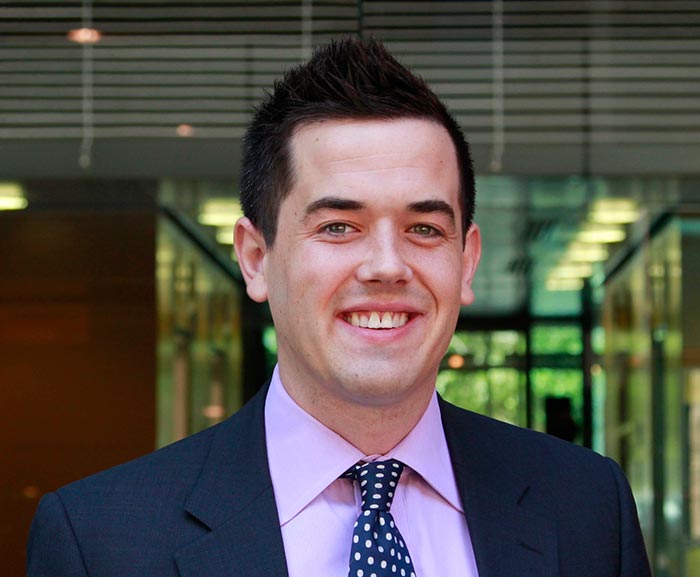Title: Gates Cambridge Scholar, Alumnus Hopes to Advance Educational Equity
Georgetown alumnus Michael Meaney (SFS’12) hopes to explore how technology might expand educational equity as one of this year’s 35 Gates Cambridge Scholars.

March 23, 2016 – Alumnus Michael Meaney (SFS’12) hopes to use his newly acquired Gates Cambridge scholarship to explore how technology might expand educational equity.
“I want to figure out how Massive Open Online Courses (MOOCs) from high-quality colleges and universities can play a part in providing flexible models for online learning that allows students access to education,” says Meaney, who believes that inequities in education disproportionately affect students from low-income communities as well as students of color. He says these inequities limit opportunities for some of the nation’s most promising students.
The Tucson, Arizona, native, who earned his bachelor’s degree in international politics from Georgetown, is one of 35 men and women selected to receive the prestigious scholarship this year for study at the University of Cambridge in the United Kingdom.
Inequitable Opportunities
Meaney will pursue a master of philosophy degree at Cambridge in education research this fall and hopes to later pursue a doctoral degree.
While he originally wanted to go to law school, his experience as a Teach For America corps member changed his mind.
“My time teaching in the classroom really brought into focus just how inequitable opportunities for young people early in life can really define life outcomes,” he says. “The students I taught were far more talented and more creative and more interesting … than I was in eighth grade, but they had grown up and gone to really poorly funded schools in really overburdened school districts that underprepared students and stunted their potential.”
Technology’s Powerful Impact
Meaney spent two years at Isaac Middle School in Phoenix, where he had nearly 40 students in each class. Close to 15 percent of them had special needs and about 40 percent were classified English-language learners, he says. The median household income in the school district is less than $29,800, compared to the city median of over $51,000, according to the U.S. Census.
But he says having the school district purchase Google Chromebooks for each student during his time teaching made a big difference.
“I witnessed the powerful impact that educational technology can have on student achievement and educational equity for students from lower socioeconomic backgrounds,” says Meaney, who worked on his master’s degree in education from Arizona State University while working for Teach For America. “That really enabled me to differentiate and diversify my instruction in a very unique and individual way.”
The Chromebooks allowed Meaney to upload his lessons online so his students could complete them at their own pace. The technology also allowed advanced students to breeze through grade-level curriculum and work on enrichment activities while Meaney worked with small groups of students who struggled with the material.
Once Meaney completed his teaching term and his master’s degree, Arizona State accepted him into its highly competitive Fellowship in University Innovation program.
“I started thinking a lot about education technology and how public policy can create incentives to leverage better outcomes,” he says.
Meaney says his students brought into sharper view the poverty and lack of opportunities for marginalized communities he had researched while at Georgetown.
Ambitious and Innovative
He delved into undergraduate research as a John Carroll Fellow and as a research assistant through the Georgetown Undergraduate Research Opportunities Program (GUROP).
“He’s one of the most ambitious and innovative students I’ve worked with at Georgetown,” says Rev. Matthew Carnes, S.J., a professor of government who worked with Meaney. “His passion for research, especially on topics of education and inclusion, was apparent even when I met him as a sophomore.”
Collaborative Leadership
The alumnus says his role as Georgetown University Student Association (GUSA) president also helped shape his ability to bring people together around a common cause.
He organized a team of students who spent the better part of a year researching and writing a report on areas for potential growth in the co-curricular experience and resources or policy changes needed to enhance the student life experience at Georgetown.
“Michael was wonderful to work with when he was GUSA President,” says Erika Cohen-Derr, assistant dean for student engagement. “He challenged the university to be its best and was a collaborative leader who invited others to contribute to a vision for change.”
Greater Service
He also was instrumental in the founding of Georgetown’s Kino Border Immersion Experience on the Arizona-Mexico border – now in its sixth year. Undergraduate fellows spend a week immersed in learning about the migration process.
Meaney worked with Rev. Kevin O’Brien, S.J., vice president of mission and ministry, on the program, co-sponsored by the university’s Office of Campus Ministry and theCenter for Social Justice, Research, Teaching and Service.
“Michael has tried to put what he learned here in service of those on the margins of society,” O’Brien says. “His further education in Cambridge will give him more skills so that he can be of even greater service when he returns to the United States. We are proud not simply of what Michael has done but who he has become as a person.”